Are you REALLY doing Baby-Led Weaning? Development of a BLW Scale with Emma Studer-Perez
In this episode we're talking about:
- Why it's so hard to define exactly “what” baby-led weaning is
- How to incorporate independence, exploration and family in your baby's meals
- Why restriction and pressure are NOT aligned with BLW
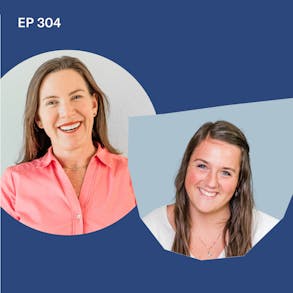
LISTEN TO THIS EPISODE
Episode Description
How do you know if you’re REALLY doing baby-led weaning? Is there a way to MEASURE whether or not you’re adhering to the tenets of baby-led weaning? Emma Studer-Perez is a PhD student in a psychology who recently co-authored a research article about the development of a BLW scale to measure adherence to the core principles of baby-led weaning. In this interview we’re exploring her findings that feeding practices centered around exploration, independence and family are central to success with baby-led weaning.
About the Guest
- Emma Studer-Perez is a PhD student in Psychology at Bowling Green State University
- She studies human food interactions across the lifespan
- Emma researches BLW to give a better understanding of defining BLW

Links from this Episode
- Learn more about Emma Studer-Perez and her doctoral work in exploring food relationships here
- Emma’s publication in the Journal of Human Nutrition and Dietetics (along with the 31 point scale) is here: http://doi.org/10.1111/jhn.13110
- Baby-Led Weaning with Katie Ferraro program with the 100 First Foods™ Daily Meal Plan, join here: https://babyledweaning.co/program
- Baby-Led Weaning for Beginners free online workshop with 100 First Foods™ list to all attendees, register here: https://babyledweaning.co/baby-led-weaning-for-beginners

Latest Episodes
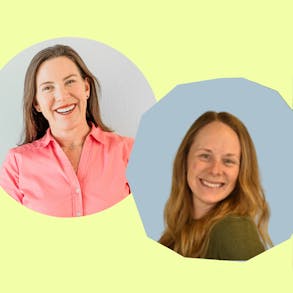
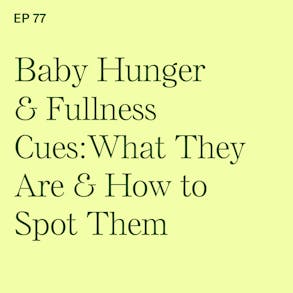
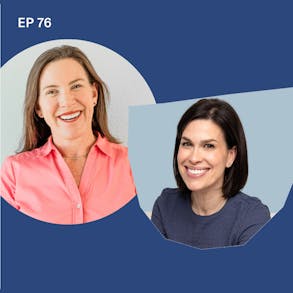
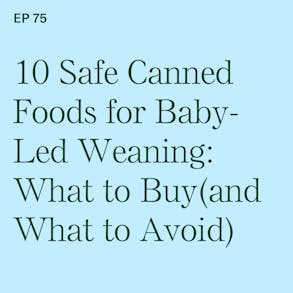
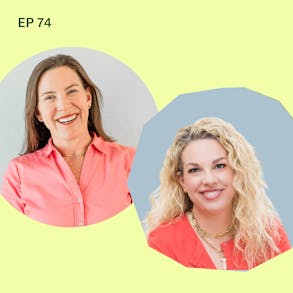
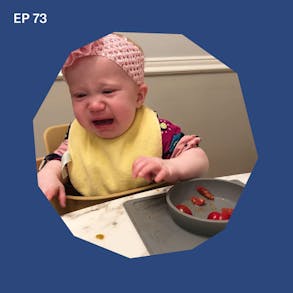
Katie Ferraro (0s):
Calling all parents of 2022 babies who were born in August, September, or October, 2022. Your baby is about ready to start solid foods. But if you are not feeling ready, I wanna invite you to join my Baby-Led Weaning Bootcamp. BLW Bootcamp is a three day online training designed to get you ready for your baby to start solid foods safely. I'm gonna be running this bootcamp from February 8th to 10th and every day I'm sending you an email that has video trainings, downloadable feeding guides. We're also gonna be doing a live q and a at the end so you can ask your individual questions. I'm covering topics like, what is baby-led weaning and what's the research that supports it? How do I know when my baby's really ready to eat? And then I wanna go through some very common roadblocks that I see happen to other families that cause them to give up and quit a baby-led approach to feeding.
Katie Ferraro (45s):
This is like a low stakes way to decide if baby Led Weaning is really right for you. The boot camp costs $15 to join, so that's just $5 per day. But you have lifetime access to the materials, so it's not like you have to skip work or anything to join the Baby-Led Weaning Boot Camp. It's taking place again from February 8th to 10th. And the space is limited. Head to BLW bootcamp.com to get signed up. If you've had figuring out baby-led weaning on your list of things to do, I hope you can join us. We're kicking off Wednesday, February 8th. And the sign up one more time is at BLW bootcamp.com
Emma Studer-Perez (1m 17s):
And that is exploration, independence and family. When we ask parents of these different questions about baby-led weaning, we saw that these three factors kind of came out suggesting that baby-led weaning is really about allowing the kid to be in control of their eating, allowing them to explore their foods, allowing them to be independent as they're eating.
Katie Ferraro (1m 37s):
Hey there, I'm Katie Ferraro, Registered Dietitian, college nutrition professor and mom of seven specializing in baby-led weaning. Here on the Baby Led Weaning Made Easy podcast I help you strip out all of the noise and nonsense about feeding, leaving you with the confidence and knowledge you need to give your baby a safe start to solid foods using baby-led weaning. How do you know if you're really doing baby-led weaning like Is there a way to measure whether or not you are adhering to the tenets of baby-led weaning? Well, my guest today is Emma Studer-Perez. She's a PhD student in a psychology program at Bowling Green State University and Emma recently co-authored a research article about baby-led weaning that was published in the Journal of Human Nutrition and Dietetics.
Katie Ferraro (2m 24s):
And if you've been listening to the podcast for any length of time, you know I always try to interview as many of the BLW researchers who are publishing in this area as I can because to be honest, there's not a ton of it. So always get stoked when I see a new publication. So, having this peer review data, it's super important because it supports baby-led weaning as a safe and effective alternative to traditional parent-led spoon feeding. And that's important for advancing not only the cause of baby-led weaning, but responsive feeding practices in general throughout the lifespan. So, Emma's paper outlined a proposed scale for measuring whether or not your current style of starting solid foods is really in lockstep with with those tenets of baby-led weaning. And her findings show that for families, the ones who are highly aligned with baby-led weaning are exhibiting behaviors that center around three areas.
Katie Ferraro (3m 8s):
So she's gonna talk about independence, exploration, and family. And so In this episode we'll be looking a little bit at the scale. And since I know you guys are interested in Baby-Led Weaning too, I wanna make sure that you check out the show notes page for this episode cause I'm gonna post her paper with the actual scale. So you can do a rundown. The scale basically contains 31 questions or rather statements and then you rate your level of agreement or disagreement with statements like, I'll give you a few examples. So, "I restrict the amount of food my child is allowed to eat during a meal." "I decide when my child stops eating", "I feed my child from baby food jars," "my infant eats the same foods as I provide for my family, in addition to breast milk or formula."
Katie Ferraro (3m 49s):
So things like that. I'll post the whole paper with the scale on the show notes page for this episode, which you can find at BLW podcast.com/304. And with no further ado, here is Emma Studer-Perez. As we talk about Are, you REALLY doing Baby-Led Weaning of her development of a baby-led weaning scale.
Emma Studer-Perez (4m 12s):
Hi, it's good to meet you. Thank you for having me.
Katie Ferraro (4m 14s):
I'm so excited to chat with you about your research and your recent publication about Baby-Led Weaning, which is published in the Journal of Human Nutrition and Dietetics, but before we get started, could you tell us a little bit about your background and the doctoral program that you're currently in?
Emma Studer-Perez (4m 26s):
Yeah, so I grew up in Ohio, born and raised, and I am currently in the doctoral program for clinical psychology at Bowling Green State University. I've always been really interested in what people eat and why they choose the things that they do eat. And so I'm really interested in looking at that across the lifespan. So some of my other research is looking at how parents and children interact to make food decisions and then starting then at infancy and how do we allow kids to start eating solid foods? And, how does that go into then how do parents and children interact as well?
Katie Ferraro (4m 59s):
So Emma as a dietitian specializing in baby-led weaning, I have just wanted since I saw your publication to say thank you for researching this important topic because for as many, you know, hundreds of thousands of parents and caregivers who are like boots on the ground learning how to give their babies a safe start to solid foods and using the principles of Baby-Led Weaning, we need more research on the effectiveness and the safety of this approach. So again, thank you. And as we kind of look at this more narrow focus of your research, tell us what it is about baby-led weaning that you're drawn to and why you decided to study that. Because there's lots of different areas of parent-child food decisions you could have gone. What was it about baby-led weaning?
Emma Studer-Perez (5m 36s):
Yeah, so I actually was looking as most people on the internet and just kind of seeing what different moms were, how moms were feeding their children and a lot of the people around me were, were using this method called baby-led weaning. And I didn't know a lot about it at the time, but I was like, wow, that's really interesting, that's really cool. And I think that's, it's really a good thing to, you know, it seemed really awesome and a better way to start maybe feeding their children. And I was like, I wonder if it is a better way, I wonder what the principles are or you know, those types of things. And so that's kind of what, how I got into it was just kind of asking those questions from what I saw on the internet from Twitter, TikTok, those types of things. But really not wanting to see it from just a popularities perspective in a pop culture perspective, but really statistically, can we back up what the principles of baby Led Weaning are?
Emma Studer-Perez (6m 21s):
The effectiveness? Can maybe one day we, we relate it to different childhood nutrition outcomes and those types of things.
Katie Ferraro (6m 28s):
I just wanna say that like a PhD candidate also using TikTok and Twitter to see like what's trending and happening. It's really important because then we look backwards and say well what is the research out there to support that? So it's nice to see that you get it cause sometimes we talk to researchers and I'm like, oh my god, have you actually ever fed a baby? Like you have no clue. But I can tell that you have definitely done your research and I know you set out to report on the development and the validation of a way to measure how parents use Baby-Led Weaning. So your paper is about a scale that you guys developed and we know historically that so much of the data about Baby-Led Weaning is qualitative with those inherent shortcomings, right? So I'm just curious what are the quantitative data points that we can look at to determine whether or not baby-led weaning is successful?
Emma Studer-Perez (7m 5s):
Like you said, there's been a ton of research qualitatively by health professionals, by parents and not only the advantages, but some of the disadvantages or what they like, what they don't like, what they're worried about. And so there's been a ton of qualitative research done, a ton relative to the quantitative stuff that has been done. And it's a lot of it has been done in the UK and Spain and South America as well. And so really when we look, you know in the US there's not qualitative or quantitative research done and we don't really know what is the operational definition of baby-led weaning. And so to even be able to say if Baby-Led Weaning is successful or not, it's first important that we know what is the definition. What are the tenets of baby-led weaning?
Emma Studer-Perez (7m 46s):
You know when you Google what is baby-led weaning, you get a lot of definitions, but statistically what does the research show that most people that say you know, what is baby-led weaning? What are the tenets? What are the principles that, that surround it to then be able to then say, okay, are we using this successfully or what is this related to? Is this related to listening to your hunger cues? Is this related to being able to not have as picky of eaters or you know, what are these outcomes looking towards?
Katie Ferraro (8m 16s):
I do wanna point out that even though there's definitely a dearth of baby-led weaning data coming out of the US like a baby is a baby is a baby and we can't discount the other important research that's been done in other countries around the world. All of which kind of point to this idea that this is a safe, viable and effective alternative to traditional parent-led spoon feeding. And I, I love the idea of kind of trying to put more concrete, not guardrails, but like some definition to it and we've had Gill Rapley, the author of the original Baby-Led Weaning book, the founding philosopher of Baby-Led Weaning on the podcast numerous times to really talk about like how do you define baby-led weaning, right? Let, let's hear from the person who created the field and the philosophy and a lot of what I do as a dietitian is the implementation. So parents like the idea of baby-led weaning, but one of the problems I found when I started out doing solid foods with my children, I have seven kids, was that having struggled with my first one with spoon feeding, my next kids were quadruplets.
Katie Ferraro (9m 6s):
And when I tried to figure out like I'm like I'm not, I'm not gonna spoon feed them, there's no way it's not gonna work. Trying to figure out how to do baby-led weaning, there was nothing out there. And so we put this whole program together, this idea of the 100 First Foods program. So I created that original program back in 2016 and we try to help parents get their babies to eat 100 different safe baby-led weaning foods before they turn one. And it's really been, it's kind of a, a great time to be working in the field of baby Led Weaning because there's this emerging body of evidence that supports the idea of diet diversity, right? The greater the number of foods and flavors and tastes and textures that babies can be exposed to early and often all lead to positive feeding and health outcomes. And so quantifying diet diversity has been a problem in the past and I was curious at the scale that you developed, which we'll talk a little bit more in a second, Is it intended to measure diet diversity or something else?
Katie Ferraro (9m 53s):
Like is it supposed to be Are you REALLY doing Baby-Led Weaning is the answer or how well are you doing baby Led Weaning?
Emma Studer-Perez (9m 59s):
Yeah, that's a great question and I think that I agree with you. Measuring diet diversity or what if a food frequency questionnaire is extremely difficult and there's not a lot of good ones out there and I think also my scale is to measure, I wouldn't say how well, but what, what are the principles of baby-led weaning? Are you upholding the principles that seem to hold together when we talk about baby-led weaning? There's three kind of sub-scales of my scale and that is exploration, independence and family. And so when we asked parents these different questions about baby-led weaning, we saw that these three factors kind of came out. So we saw that family came out, this independence and this exploration suggesting that baby-led weaning is really about allowing the kid to be in control of their eating, allowing them to explore their foods, allowing them to be independent as they're eating.
Emma Studer-Perez (10m 51s):
Then there's also seems to be this family aspect of it of you're eating the same foods that your family's eating. That you're sitting with them during mealtimes, special mealtimes are not being placed just just for the child, I mean you meaning the child.
Katie Ferraro (11m 3s):
Hey, we're gonna take a quick break but I'll be right back. If you like learning about baby-led weaning, but you're not entirely sure if this is the approach for you and you haven't started solid foods yet or if you've been doing purees and you wanna make a switch to a baby-led approach, don't forget to sign up for the baby-led weaning bootcamp. This is a three-day online training I'm running February 8th to 10th, it costs just $15 to join and you can sign up at BLW bootcamp.com for a quick three-day training to get you in shape so that your baby's ready to start solid foods. And Emma, can you share a few of the scale items or the prompts so that our listeners can kind of get an idea like we will share your actual paper and the full scale, but just so you can see like what sort of questions would you be asking yourself to determine where you fall as far as your parenting style goes with regards to if you are adhering to baby-led weaning or not?
Emma Studer-Perez (12m 0s):
Yeah, so I have, again, like I said those three different factors, but wonder if you will like the family factor. So that family kind of principle. The item is, my infant should eat different foods than what the family eats and that's going to be a reverse coated item. So if you, you say that your infant does eat different foods than your the family eats, that would suggest that you aren't using baby-led weaning. Maybe a better item to do for that one is like my infant should be allowed to sit with the family at mealtime. So again, this family aspect for the infants there, they're eating the same foods, they're with the family during all the mealtimes. And then also for exploration we have, you know, I introduce new foods to my child frequently, so we allow them, which goes right into that, that 100 foods before age one type of philosophy is, you know, we're really constantly, parents are should be constantly trying to introduce foods to their child with their texture, different taste.
Katie Ferraro (12m 52s):
But whats frequently like that's so subjective. Like you know, traditionally spoon-fed babies have had most 10 to 12 foods and those parents think they're feeding a lot of foods until they see another baby who eats a hundred foods. Like are you defining frequently?
Emma Studer-Perez (13m 3s):
I don't define frequently in there, but I think meaning frequently, meaning daily, every meal, those types of things. And so because we, this is kind of like the first step at a scale of the operational definition, nailing that down in research. This is kind of, you know, frequently meaning as frequently as possible. And then for independence my baby brings the food up to their mouths or my baby feeds themselves in the couple of the items.
Katie Ferraro (13m 28s):
What are the infant feeding styles that someone who completes your scale can be classified as?
Emma Studer-Perez (13m 32s):
So again, the skill is to measure the like the principles, how, how much are they adopting a baby-led weaning philosophy as a complimentary feeding style. And so at this point it's not different categories that they put in but more of this continuous variable. So are they high on using the different philosophies for baby-led weaning at this current point we cannot put them into like a feeding style because we don't, we just don't have the research on that yet. That's going to be a future aim where we really look at how different infant feeding styles, different parenting styles are related to baby-led weaning or the scale of baby-led weaning.
Katie Ferraro (14m 6s):
So obviously a peer reviewed publication, a little dense. So if you can, would you summarize your findings for our listeners about what your study actually determined or found?
Emma Studer-Perez (14m 14s):
Yeah, so today there is limited definitions empirically, so in research on what baby-led weaning is. There's a lot of things in pop culture that you see on the media. There's limited amount in the research that we can really use then to understand baby-led weaning more fully. So this study created a scale to measure baby-led weaning as a complimentary feeding style. And there based on the research there were three main factors of baby-led weaning that emerged which were exploration, independence and family. Meaning that the tenants we see that are really upholding baby Led Weaning as a philosophy is the exploration of foods being independent in the eating and then the family kind of aspect.
Emma Studer-Perez (14m 55s):
And so, therefore, future research should target the effects of baby-led weaning on child nutrition and feeding outcomes so that we understand the positive and or consequences of baby-led weaning. What are the benefits? Why should we be doing this? Why should we advise parents to do this? And not only just based on, you know, what we know anecdotally from parents, but really what can we prove research wise in the future.
Katie Ferraro (15m 19s):
So what are some of the limitations to your study and in studying baby-led weaning in general?
Emma Studer-Perez (15m 23s):
Yeah, there are limitations to the study and so the sample that we used for this study was recruited with cloud research, which is just an online platform where people go and take surveys for money. These people have more experience to technology they have, they may have a higher socioeconomic status. And so these things could have skewed our results. That could have changed the way people responded because they may or may not had more exposure to concepts such as baby-led weaning. And so that could have changed the results also relied on parents self-report data. We know that sometimes parents are not the best at self-reporting or just people in general are not the best at reporting about their own behaviors. And so future research, I really would love to look at this more as an observational study or something called an ecological momentary assessment where we have people take surveys in the moment to be able to see how these, these behaviors unfold in daily life.
Emma Studer-Perez (16m 14s):
And so instead of you know, asking for self-report of something that happened, you know, retrospectively or in the past, having them do it in the moment.
Katie Ferraro (16m 22s):
Hey we're gonna take a quick break but I'll be right back.
Katie Ferraro (17m 30s):
Emma for your next study, I got some huge sample sizes for you of parents who are totally representative of all parents in the world doing baby-led weaning, who would love to help you out with your research. Especially with, I like the idea of the ecological momentary assessments because I know you're getting a PhD in psychology but as a Registered dietitian, like the biggest problem with nutrition science is self-reported data when it comes to, you know, food frequency questionnaires for example, like since the time you were born, tell me how many times a week you had broccoli. Like how freaking accurate is that going to be? Not at all. And so observing and watching what the babies are eating in real time, especially because we have this very short window, that flavor window is not very long. This period where babies will readily like and accept such a wide variety of foods, you know parents are really tuned into that.
Katie Ferraro (18m 12s):
I know when I saw the paper and I saw the cloud research and these are, you know obviously there's limitations to all data, but like paying people to complete surveys, there are going to be inherent limitations in there, but the self-reported data I would argue in some cases with the parents is much more accurate than when we do it for adults because the parents are the ones actually prepping the food, watching the intake, analyzing how much is left over, they're like little researchers in every single household. So I think there's definitely interest in this area of research and if you had like no budgetary restrictions whatsoever cause yeah like I'd love to do an observational study of what all babies eat across, you know, their entire lifespan and how baby-led weaning did or did not alter their relationship with food down the road, but that's not realistic given you know, financial limitations. But like if you literally had no budgetary restrictions, what sort of baby-led weaning study would you like to design next and why?
Emma Studer-Perez (18m 56s):
Yeah, so I really think that's an interesting question because you know that every researcher wants no, no budgetary restriction. I think that sometimes we really have to control our research because of monetary compensation and think I would really love to do, like I said, an ecological momentary assessment study where we really have people take pictures of food that they're feeding their child before and then after so we can see, you know, how much did the child eat or how much did they play around in it, those types of things. But not only that, but also go cross-cultural. A baby is a baby, is a baby. And I agree with that. And I also think at the same time that culture around food is so different in different parts of the world. For example, in the Dominican Republic, baby-led weaning looks very different.
Emma Studer-Perez (19m 36s):
How they feed their children from six months old up, looks very different in seeing that anecdotally and hopefully in research in the future. So I would love to be able to do a study where we look at exactly what the babies are eating every meal across cultures and seeing if the same tenants apply across cultures. Are we using it the same way? Does it look different in different cultures? Just because of the different cultures around food.
Katie Ferraro (20m 1s):
Emma this is my YouTube original series that I've like been brainstorming or pitching for Netflix or whatever, like just watching babies eat around the world, you know, because parents are like, oh my gosh baby-led weaning is new and faddy and trendy. No it's not. The idea that we would have commercial baby food that's highly packaged, processed, added sugars and salts, that's really only been around since the earlier part of the 20th century. Like what do you think Cave mama fed her baby back in the day before there was like entire aisle of pouches at Target to feed your baby. They fed modified versions of the same foods the rest of the family eats. And so I do like this idea, I teach cultural foods at San Diego State University and we always talk about, you know, the introduction to food and like just put yourself back in time when there was not commercial baby food, baby-led weaning, you can call it that, you know as a philosophy and a practice even term that, that, that's relatively new, but as the actual practice of having your babies eat these modified foods, it's really nothing new.
Katie Ferraro (20m 53s):
Babies in Ethiopia, eat Ethiopian foods. Baby in in Nepal, eat Nepalese foods. Babies in the United States can eat the real foods modified versions of the same ones the rest of their parents do. So it's kind of funny that there's this like whole field around it, but I am very grateful that you guys are doing some more research in it. And tell me where our audience can go to learn more about your work Emma.
Emma Studer-Perez (21m 11s):
Yeah, so they can go to learn more about my work online, so on my profile at Bowling Green State University. And you can go under the psychology tab, look me up. My work is there, recent publications, those types of things. I am fairly new into the research of baby-led weaning, but there will be more coming out. We're working on a publication right now that is getting ready to go to journals to hopefully get published there. So I am just starting out, but there's much more to come in the in the world of Baby-Led Weaning for me.
Katie Ferraro (21m 39s):
Well thank you so much for doing this interview and I will put a link to all of your resources, including the paper that we were discussing today on the show notes page for this episode, which you can find at BLW podcast.com. Thanks so much, Emma.
Emma Studer-Perez (21m 49s):
Thank you. It was good to be here.
Katie Ferraro (21m 52s):
Well, I, hope you guys enjoyed that interview with Emma Studer-Perez. Again, she's a co-author of a recently published article in the Journal of Human Nutrition and Dietetics about the development of a baby-led weaning scale. I'll link to the paper that includes the 31 question prompts that you can ask yourself to kind of get a gauge on like, hmm is what I'm doing really baby-led weaning. That'll all be on the show notes page for this episode, which you can find at BLW podcast.com/ 304. And a special thank you to our partners at AirWave Media. If you guys like Podcasts that feature food and science and using your brain, definitely check out some of the other podcast offerings from AirWave Media. Our baby-led weaning podcast is on the web at BLW podcast.com and I'll see you guys next time.

The Program Baby-Led Weaning with Katie Ferraro
A step-by-step digital program for starting solid foods safely and navigating the original 100 FIRST FOODS™ meal plan with baby-led weaning.
 EXPERT-LED, PROVEN APPROACH TO EATING REAL FOOD
EXPERT-LED, PROVEN APPROACH TO EATING REAL FOOD CONCISE VIDEO TRAININGS TO MASTER BABY-LED WEANING
CONCISE VIDEO TRAININGS TO MASTER BABY-LED WEANING 100 FIRST FOODS DAILY MEAL PLAN WITH FOOD PREP VIDEOS
100 FIRST FOODS DAILY MEAL PLAN WITH FOOD PREP VIDEOS
Baby-Led Weaning for Beginners Free Workshop
Is your baby ready to start solid foods, but you’re not sure where to start? Get ready to give your baby a solid foundation to a lifetime of loving real food…even if you’re feeling overwhelmed or confused about this next stage of infant feeding.
Get baby-led weaning recipes and tips delivered to your email inbox.

